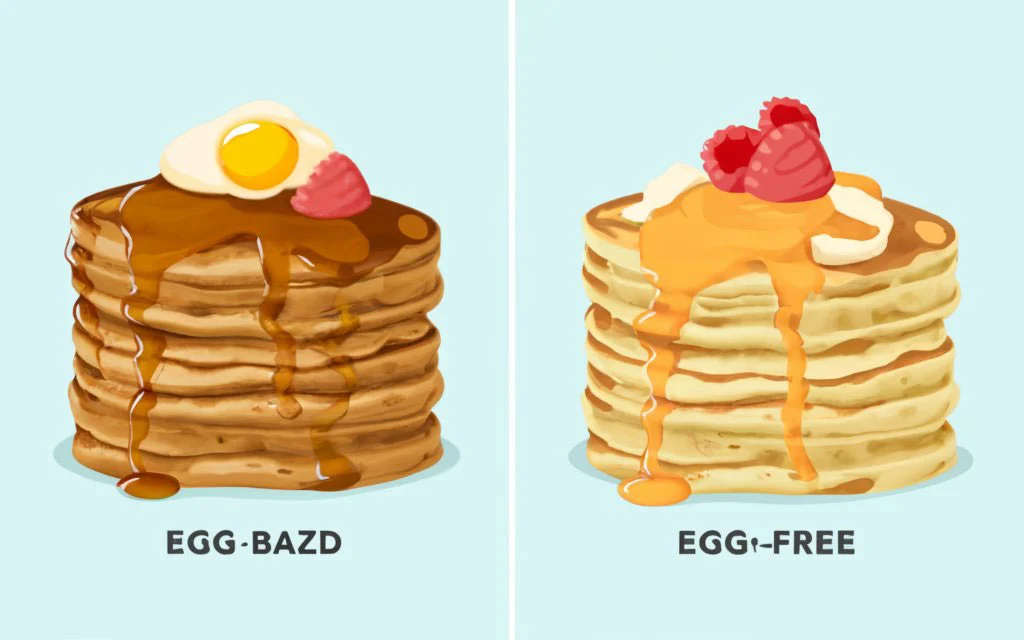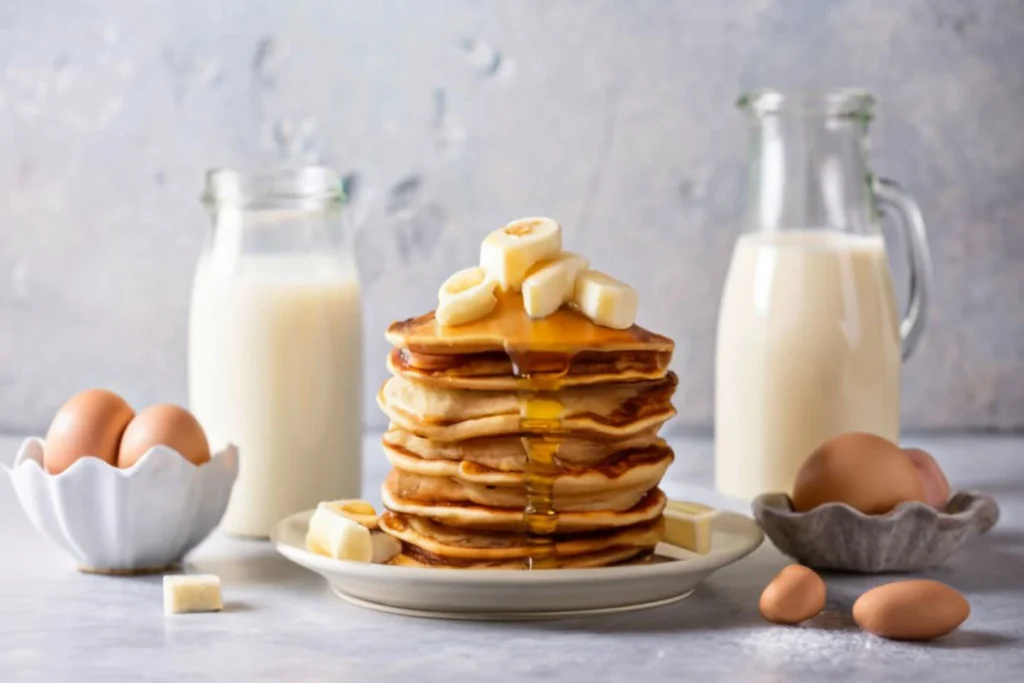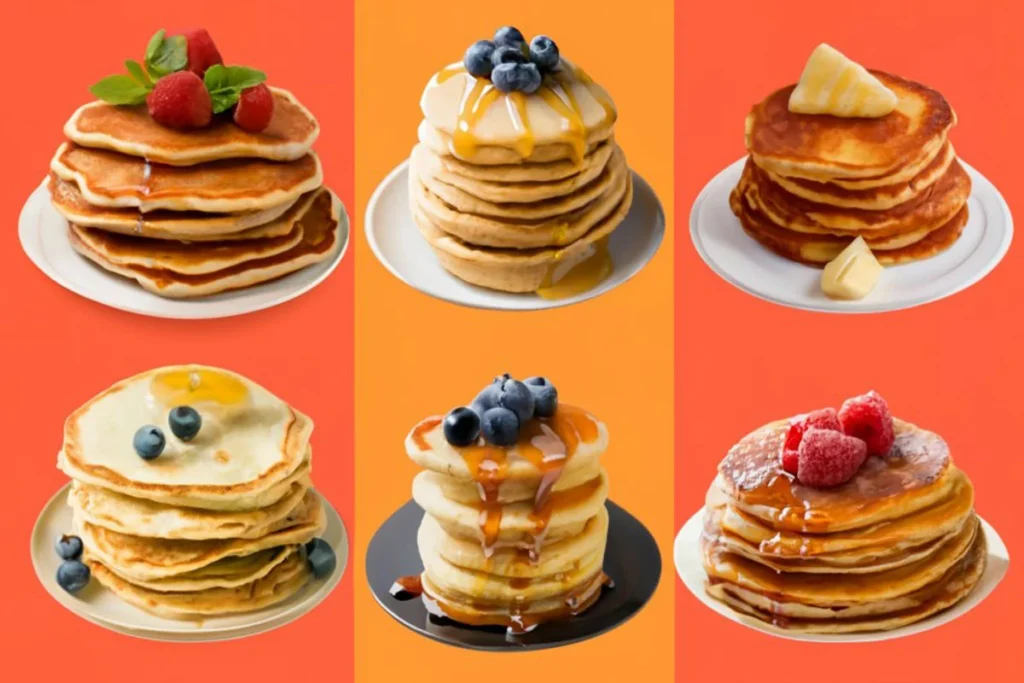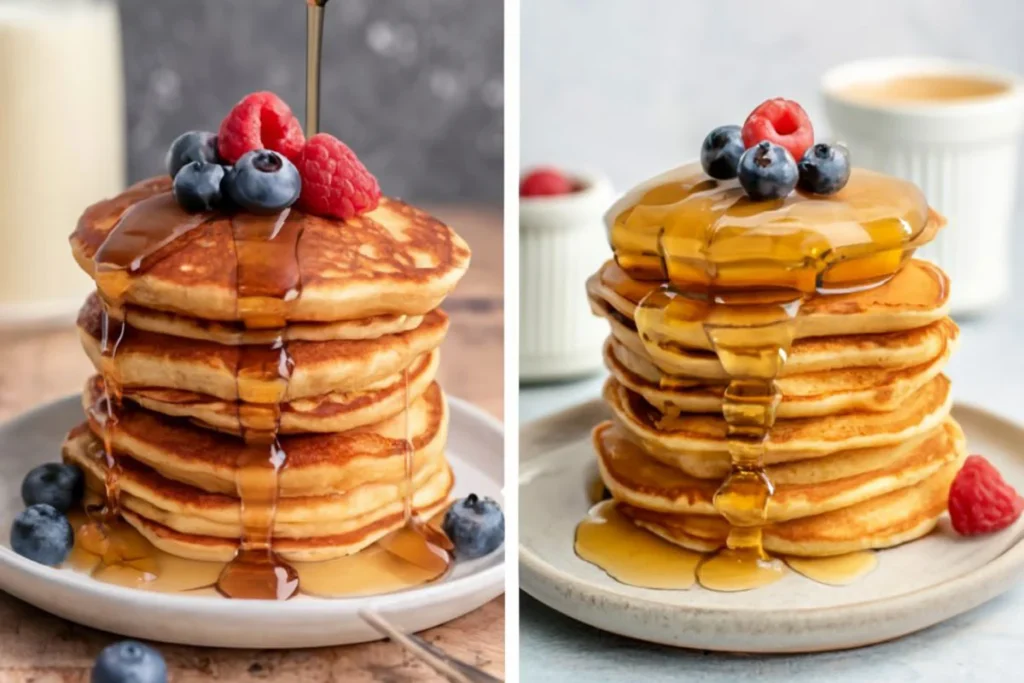In the world of breakfast delights, pancakes stand out as a universal favorite. But when it comes to their preparation, one question often arises: is the inclusion of eggs a must? This article delves into the essence of pancakes, exploring the traditional role of eggs and unveiling a realm of possibilities with egg-free alternatives. Join us on a culinary journey that promises to enrich your pancake experience, whether you’re a traditionalist or open to a twist on the classic.
Exploring the World of Egg-Free Pancakes and Their Varieties
Pancakes, those delightful, fluffy discs that grace our breakfast tables, have a story as rich and varied as their many recipes. From the thin, crepe-like pancakes of France to the thick, hearty stacks found in American diners, pancakes are a global affair, each variety reflecting the unique culinary traditions of its homeland.
The Rich History of Eggless Pancake Recipes
The history of pancakes stretches back thousands of years, making them one of the oldest forms of bread known to humanity. Ancient civilizations, from the Greeks and Romans to the Chinese, had their versions of pancakes, using different grains, milks, and, yes, sometimes eggs, to create a versatile dish that could be sweet or savory.
Global Egg-Free Pancake Delights
As we journey across the globe, we encounter an astonishing diversity of pancakes. In Ethiopia, the injera is a sourdough-risen flatbread with a unique, slightly spongy texture, a far cry from the thick and fluffy American pancake. Move over to Russia, and you’ll be greeted by blinis, small, yeasty pancakes traditionally topped with caviar and sour cream. Each country’s pancake tells a story, a delicious narrative woven from the fabric of its culture and culinary traditions.
The beauty of pancakes lies not just in their taste but in their adaptability. They can be a canvas for a myriad of toppings, from the classic maple syrup and butter to fresh fruits, chocolate chips, or even savory options like bacon and cheese. The possibilities are as limitless as the imagination of the cook.
Understanding Egg’s Role in Traditional Pancakes
When it comes to whipping up a batch of pancakes, eggs are often seen as the secret ingredient that transforms the batter from good to great. But what exactly do eggs do in pancakes, and is it possible to achieve that perfect pancake without them?
The Ingredients of Classic vs. Vegan Pancakes
At its core, a pancake batter consists of flour, milk, and eggs. Each ingredient plays a pivotal role in the final product. Flour provides the structure, milk adds moisture, and eggs? They’re the multitaskers of the pancake world.
Eggs are composed of two main parts: the white and the yolk. The whites are primarily protein, which helps to give pancakes their structure and fluffiness. When beaten, egg whites introduce air into the batter, making pancakes light and airy. The yolks, rich in fats, contribute to the pancake’s tenderness and lend a subtle richness to the flavor.
The Essential Role of Eggs in Traditional Pancake Recipes
Eggs serve several key functions in pancake batter:
- Structure and Stability: The proteins in eggs set as they cook, providing structure and stability to the pancakes, ensuring they hold together and don’t crumble when you try to flip them.
- Leavening Agent: Eggs work alongside baking powder or baking soda to give pancakes their rise, resulting in that sought-after fluffy texture.
- Moisture and Richness: The fat in egg yolks adds moisture and richness, making the pancakes tender and adding depth to the flavor.
But what if you’re allergic to eggs, vegan, or simply out of eggs? Does this mean the end of your pancake dreams? Not at all. The culinary world is brimming with egg alternatives that can mimic the effects of eggs in pancakes, from banana and applesauce to flaxseeds and commercial egg replacers. Each alternative brings its unique properties to the batter, and while the texture and taste might differ slightly, the result can be just as satisfying.
Delicious Egg-Free Pancake Alternatives
Diving into the realm of egg-free pancakes opens up a world of culinary creativity and inclusivity. Whether due to dietary restrictions, ethical choices, or simply running out of eggs, discovering how to craft delicious pancakes without this traditional ingredient can be both rewarding and enlightening.
Discovering Tasty Egg Alternatives for Vegan Pancakes
The quest for the perfect egg substitute in pancakes is not just about finding a single magical ingredient; it’s about understanding how different substitutes can affect the texture, taste, and overall experience of your pancake. Here are some popular egg alternatives that have proven to make delightful pancakes:
- Bananas: Mashed bananas not only add moisture and bind the ingredients together but also infuse the pancakes with a subtle sweetness and a boost of nutrients.
- Applesauce: A great way to reduce fat while still keeping pancakes moist and fluffy, applesauce is a favorite among health-conscious pancake lovers.
- Flaxseeds or Chia Seeds: When mixed with water, these seeds create a gel-like consistency that mimics the binding property of eggs, adding a nutty flavor and a dose of omega-3 fatty acids.
- Commercial Egg Replacers: These are specifically designed to replicate the properties of eggs in baking and cooking, making them an easy and effective substitute in pancakes.
For those interested in egg-free options, discovering Tasty Egg Alternatives for Vegan Pancakes can open up a new world of breakfast possibilities.
Must-Try Eggless Pancake Recipes for Every Diet
Embracing egg-free pancake recipes doesn’t mean compromising on taste or texture. Here are a couple of recipes that showcase the versatility and deliciousness of egg-free pancakes:
- Classic Vegan Pancakes: Using a simple blend of flour, almond milk, and baking powder, with a touch of vanilla for flavor and applesauce for binding, these pancakes are light, fluffy, and completely vegan.
- Banana Oat Pancakes: For a gluten-free option, blend rolled oats to make oat flour, and combine with mashed banana, almond milk, and a pinch of cinnamon for a hearty and healthy start to your day.
These recipes demonstrate that with the right ingredients and techniques, you can create pancakes that are just as delicious without eggs. It’s all about experimenting and finding what works best for your taste and dietary needs.
Discovering Tasty Egg Alternatives for Vegan Pancakes, as highlighted by The Vegan Society, can open up a world of flavorful and ethical breakfast options
Flavor and Texture: Egg vs. Egg-Free Pancake Comparison
Eggs play a big role in classic pancakes, adding flavor and texture. Yet, exploring egg-free options has changed pancake making. It challenges old norms and brings new textures and flavors.
The Taste Test: Egg-Inclusive vs. Egg-Free Pancake Recipes
The difference between egg-based and egg-free pancakes can be quite pronounced, affecting everything from the batter’s consistency to the final product’s mouthfeel.
- Texture: Eggs contribute to the fluffiness and lightness of pancakes due to their leavening properties. Without eggs, pancakes might have a denser texture, but this can be mitigated with the right egg substitutes and adjustments in leavening agents.
- Flavor: Eggs add a richness to pancakes that is subtle yet distinct. Egg-free pancakes might lack this depth initially, but they offer a canvas for other flavors to shine through, such as the sweetness of bananas or the nuttiness of flaxseeds.
Crafting the Perfect Eggless Pancake: A Culinary Adventure
Embracing egg-free pancakes doesn’t just cater to dietary restrictions; it opens up a realm of culinary creativity. Here are some insights into making egg-free pancakes that still delight the palate:
- Innovative Ingredients: Utilizing ingredients like sparkling water can introduce airiness into the batter, somewhat mimicking the leavening effect eggs would have.
- Texture Tweaks: Incorporating ingredients with natural binding properties, such as banana or applesauce, can help achieve a desirable consistency in the batter, leading to tender pancakes.
- Flavor Fusion: Without the subtle flavor of eggs, other ingredients get a chance to take center stage. Spices like cinnamon, vanilla extract, or even a dash of citrus zest can elevate the flavor profile of egg-free pancakes.
Exploring egg-free pancakes is more than just swapping ingredients. It’s about redefining pancakes. This journey opens up options for all dietary needs. Now, everyone can enjoy the joy of warm pancakes.
Nutritional Considerations
When it comes to pancakes, the debate over including eggs isn’t just about taste and texture; it also touches on nutritional aspects. Eggs are a powerhouse of nutrients, offering high-quality protein, vitamins, and minerals. However, for those who prefer or need to exclude eggs from their diet, understanding the nutritional implications is key to maintaining balanced and healthful eating habits.
Eggs in a Balanced Diet
Eggs are celebrated for their nutritional density, providing a good source of protein, vitamin D, B vitamins, and essential minerals like selenium and phosphorus. This makes them a valuable ingredient in pancakes, contributing to the meal’s overall nutritional profile. The protein in eggs not only supports muscle repair and growth but also contributes to the feeling of fullness, making egg-based pancakes a satisfying breakfast option.
Considering Dietary Restrictions and Allergies
For individuals with egg allergies, dietary restrictions, or ethical considerations that lead them to avoid eggs, finding nutritious alternatives is crucial. The good news is that many egg substitutes also bring their own set of nutritional benefits:
- Bananas and Applesauce: These fruit-based substitutes add natural sweetness and moisture to pancakes without the need for added sugars. They also provide dietary fiber, vitamins, and minerals.
- Flaxseeds and Chia Seeds: When used as egg replacements, these seeds not only help bind the pancake batter but also contribute significant amounts of omega-3 fatty acids, fiber, and antioxidants.
- Dairy-Free Milks: For those also avoiding dairy, using almond, soy, or oat milk in place of traditional cow’s milk can add different nutrients to the pancakes, such as calcium, vitamin E, and heart-healthy fats, depending on the milk chosen.
Balancing Nutrition in Egg-Free Pancakes
Making nutritious egg-free pancakes is key. Here are tips to boost their health value:
- Incorporate Whole Grains: Using whole grain flours like whole wheat, oat, or buckwheat can increase the fiber content and add a range of B vitamins and minerals to your pancakes.
- Add Nuts and Seeds: Mixing in ground nuts or seeds can enhance the protein content and introduce healthy fats and micronutrients, making your pancakes more nutritionally rounded.
- Top Wisely: Choose toppings that add nutritional value, such as fresh fruits, natural yogurt, or nut butters, rather than high-sugar syrups or spreads.
Understanding the Nutritional Profile of Eggless vs. Traditional Pancakes is crucial for making informed dietary choices, as discussed by The Vegan Society.
Whether you’re enjoying egg-based or egg-free pancakes, the key is to consider the overall nutritional balance of your meal. By thoughtfully selecting ingredients and toppings, pancakes can fit into a healthful diet, providing both nourishment and pleasure.
Expert Tips and Tricks
Mastering pancake art is about discovery, experimentation, and fun. Whether making traditional egg pancakes or trying egg-free options, expert tips can make yours stand out. Here are some top tips for perfect pancakes.
Professional Chefs’ Advice on Perfect Pancakes
- Don’t Overmix the Batter: Achieving the perfect pancake texture starts with the batter. Experts advise mixing until the ingredients are just combined. Overmixing can lead to gluten development in the flour, resulting in tough pancakes.
- Rest the Batter: Allowing the batter to rest for at least 5 to 10 minutes gives the flour time to absorb the liquid fully and the gluten strands to relax, leading to lighter, fluffier pancakes.
- Use a Consistent Heat: Finding the right temperature is crucial. A griddle or pan that’s too hot will burn the pancakes before they’re cooked through. Medium heat is often recommended for a golden exterior and a fully cooked interior.
- Test for Doneness: Knowing when to flip is key. Look for bubbles that form and pop on the surface of the pancake, and ensure the edges look set. This is usually a good indicator that it’s time to flip.
Common Mistakes to Avoid
Even seasoned pancake makers can run into pitfalls. Here are some common mistakes to watch out for:
- Pouring Too Much Batter: Resist the temptation to make giant pancakes. Smaller pancakes are easier to flip and cook more evenly.
- Flipping Too Soon or Too Often: Patience is a virtue with pancakes. Flip them only once to maintain a light and airy texture.
- Neglecting the Pan: A well-greased, non-stick pan or griddle is essential to prevent sticking and ensure a smooth flip.
Egg-Free Pancake Specific Tips
For those making egg-free pancakes, a few additional considerations can help mimic the qualities that eggs typically provide:
- Choose the Right Substitute: Depending on the desired outcome, select an egg substitute that complements the other ingredients. For moisture and binding, bananas or applesauce work well; for fluffiness, a bit of vinegar mixed with baking soda can add lift.
- Adjust Liquid Quantities: Egg substitutes can alter the batter’s moisture content. Be prepared to adjust the amount of liquid to achieve the right consistency.
- Experiment with Flavors: Without the richness that eggs provide, consider enhancing your pancakes with vanilla extract, cinnamon, or citrus zest for an extra flavor dimension.
Making pancakes is both art and science. Use these tips and avoid common mistakes for perfect pancakes, with or without eggs. Next, we’ll answer common pancake questions with quick, insightful responses.
Your Egg-Free Pancake Questions Answered
In the world of pancakes, questions abound, from achieving the perfect fluffiness to navigating dietary restrictions. Here’s a roundup of some frequently asked questions that might arise on your pancake-making journey.
Can Pancakes Be Fluffy Without Eggs?
Yes! Eggs help pancakes rise, but alternatives work too. Baking powder, baking soda with vinegar, or carbonated water can make pancakes fluffy without eggs.
Are Egg-Free Pancakes Healthier?
The healthiness of egg-free pancakes largely depends on the ingredients used. Egg substitutes like bananas, applesauce, or flaxseeds can add nutritional benefits, such as fiber and essential fatty acids. The nutritional profile depends on several factors. These include the flour type, added sugars, and toppings.
How Do Eggs Affect the Cooking Process of Pancakes?
Eggs are key in pancake batter. They bind ingredients, add moisture, and help pancakes rise. Without eggs, you may need to tweak cooking times and temperatures.
What’s the Best Egg Substitute for Pancakes?
The “best” egg substitute can vary depending on personal taste preferences and dietary needs. For a neutral flavor and binding properties, commercial egg replacers or a flaxseed/water mixture work well. For added sweetness and moisture, mashed bananas or applesauce are excellent choices. It’s often worth experimenting with a few options to find your favorite.
Can I Make Pancakes Without Milk?
Yes, pancakes can be made without traditional cow’s milk. Many dairy-free alternatives, such as almond milk, soy milk, oat milk, or even water, can be used without significantly affecting the texture or flavor of the pancakes. This makes pancakes a versatile option for those with dairy allergies or lactose intolerance.
How Can I Make My Pancakes More Nutritious?
To boost pancake nutrition, use whole grain flours like whole wheat or oat. Add pureed fruits or veggies, such as pumpkin or sweet potato, for more vitamins. Top with fresh fruit, nuts, or seeds instead of syrup for extra nutrients without losing flavor.
Pancakes are a favorite breakfast, fitting many diets and nutritional needs. Enjoy classic egg-based or try egg-free and dairy-free versions. Great pancakes come from quality ingredients, careful preparation, and the joy of sharing.
For more insights, check out the Egg-Free Pancake FAQs: Expert Answers to Your Queries, where common concerns are addressed in detail.
conclusion
Pancakes have a rich history and adapt to many diets, showing their versatility and appeal. You might like traditional fluffy pancakes or prefer egg-free ones for health or ethical reasons. Pancakes allow for creativity and personal expression.
Exploring the role of eggs and finding substitutes shows that anyone can enjoy pancakes suited to their diet without losing taste or texture. This article’s tips and answers aim to help home cooks experiment confidently, making tasty and nutritious pancakes.
Pancakes are more than breakfast; they’re a global phenomenon that brings people together. They add comfort, satisfaction, and sweetness to the day. Whether you’re making pancakes on a Sunday morning or trying new ingredients, the possibilities are endless. So, grab your spatula and keep the pancake adventure going, one bite at a time.



